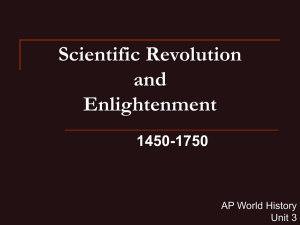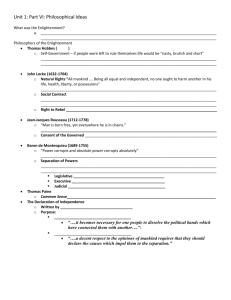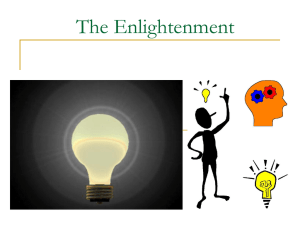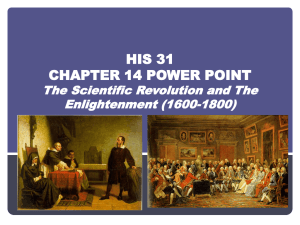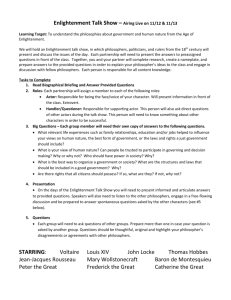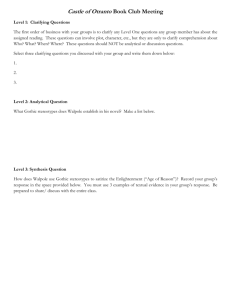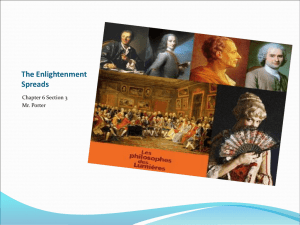Enlightenment/Revolution Notes
advertisement
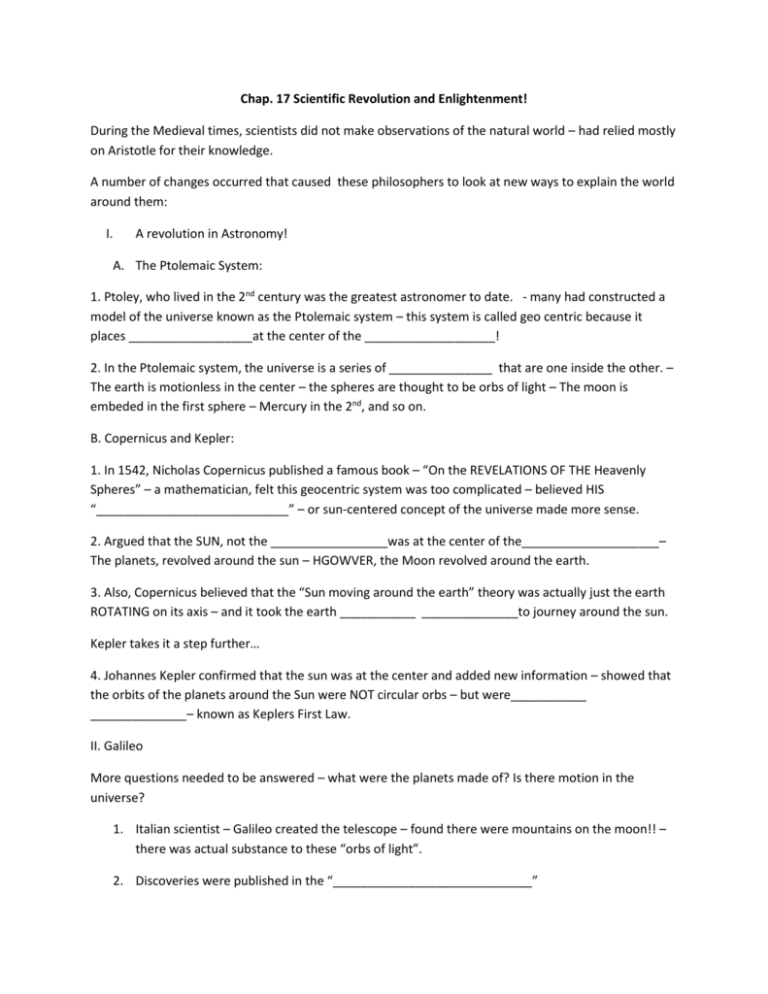
Chap. 17 Scientific Revolution and Enlightenment! During the Medieval times, scientists did not make observations of the natural world – had relied mostly on Aristotle for their knowledge. A number of changes occurred that caused these philosophers to look at new ways to explain the world around them: I. A revolution in Astronomy! A. The Ptolemaic System: 1. Ptoley, who lived in the 2nd century was the greatest astronomer to date. - many had constructed a model of the universe known as the Ptolemaic system – this system is called geo centric because it places __________________at the center of the ___________________! 2. In the Ptolemaic system, the universe is a series of _______________ that are one inside the other. – The earth is motionless in the center – the spheres are thought to be orbs of light – The moon is embeded in the first sphere – Mercury in the 2nd, and so on. B. Copernicus and Kepler: 1. In 1542, Nicholas Copernicus published a famous book – “On the REVELATIONS OF THE Heavenly Spheres” – a mathematician, felt this geocentric system was too complicated – believed HIS “____________________________” – or sun-centered concept of the universe made more sense. 2. Argued that the SUN, not the _________________was at the center of the____________________– The planets, revolved around the sun – HGOWVER, the Moon revolved around the earth. 3. Also, Copernicus believed that the “Sun moving around the earth” theory was actually just the earth ROTATING on its axis – and it took the earth ___________ ______________to journey around the sun. Kepler takes it a step further… 4. Johannes Kepler confirmed that the sun was at the center and added new information – showed that the orbits of the planets around the Sun were NOT circular orbs – but were___________ ______________– known as Keplers First Law. II. Galileo More questions needed to be answered – what were the planets made of? Is there motion in the universe? 1. Italian scientist – Galileo created the telescope – found there were mountains on the moon!! – there was actual substance to these “orbs of light”. 2. Discoveries were published in the “_____________________________” 3. _________________ordered Galileo to _______________is Copernican ideas – threatened the Churches' entire concept of the universe because it conflicted with the bible. 4. Many were now agreeing with these throes – but the question of MOTION in the universe had not been answered… III. Newton 1. Sir Isaac Newton, an Englishman, defined 3 laws of motion that governed how the planetary bodies work – important to his ENTIRE work was the universal_______________ __________ ______________– this explains why planetary bodies don’t move in straight lines but ________________about the sun – the force that does this is gravity. IV. The Scientific Method 1. During the Scientific Revolution, people became concerned about how to best understand the physical world (Physics). 2. The result was the scientific method – a systematic procedure for collecting and looking at evidence – this method is very important to science 3. Francis Bacon, believed that instead of relying on ideas by ancient authorizes – scientists would use inductive reasoning..(Whats that?) 4. 4. Scientists should use systematic and carefully organized _________________ to test theories. Section 2 – The Enlightenment! I. Path to Enlightenment 1. Was a movement of intellectuals who were greatly impressed with the _____________________ ___________________ 2. Believed they could apply scientific method to understand all life and how it works. 3. Influenced the most by 2 men –Isaac______________ and John ______________________: a. To Newton, geophysical world was like a________________ and he wanted to discover the laws that controlled it. b. John Locke argued that everyone is born with a tabula rasa, or a “_____________________”– and people are molded by the experiences of their surrounding world. II. The Philosphes and Their Ideas: 1. The intellectuals of the Enlightenment were known as ___________________– most were French – believed the role of philosophy was to change the world. Who were these philosophers? A. Montesquieu: 1. Identified 3 basic kinds of governments: a. -______________– good for small states b. despotism – good for LARGE states or countries. c.______________– suitable for medium states He believed a government should function through a separation of powers: Executive – Legislative Judicial B. Voltaire: 1. Greatest figure of the Enlightenment was known simply as “Voltaire” – believed in something called_______________– believed a mechanic (God) created the universe – and the universe was like a ______________God was the clockmaker – set the universe in motion and will allow it to run without his interference – it will run according to its own ________________ ________________. Section 3 – The Impact of Enlightenment! What types of impact did the Enlightenment have on culture? A. The Arts 1.The Baroque and neoclassical styles had dominated Europe for many years – however, a new artistic style –______________began to spread all over Europe. 2. Unlike Baroque which had expressed grandeur and power – rococo expressed grace, elegance and charm. – Delicate colors were used. B. Music 1. The 18th century was one of the greatest periods for music EVER to happen in Europe. 2 composers – Johann Sebastian Back and George Handel stood out as musical geniuses. 2. ______________composed his Mass in B Minor and other works that would give him this reputation. 3. ______________was also German – his Messiah had been called a “rare work” that appealed to almost anyone that listened. 3. Wolfgang Amadeus Mozart was truly a child prodigy – wrote passionate, exciting music II. The Enlightenment and Enlightened Absolutism 1. Now, enlightenment thought had an effect on the ____________________life of Europe for a long time – such as natural rights for people – freedom of __________________ 2. Many agreed on a new type of absolutism – enlightened absolutism – rulers now tried to govern with enlightenment principles and STILL maintain _____________ _________________. Did Europe's rulers, however, actually follow the advice and do this? To answer that question, we can examine 3 states – Prussia, Austria and Russia. A. Prussia: 1. Frederick II (Or Frederick the Great) was one of the best __________________ and cultured kings – well versed in ideas of enlightenment. 2. Enlarged his army – abolished use of _____________– granted limited freedom of the press and speech – but kept a rigid social structure. B. The Austrian Empire 1. Empress Maria Therese of _______________ _________NOT open to philosophers – but did work hard to make the lives of serfs better in her country. 2. Her son, however, was the _________________e –________________– abolished serfdom, eliminated the death penalty and established religious toleration – however, it didn’t go over very well 3. His nobles were angry for making serfs _________________to them – these policies were way too drastic for the times C. Russia under Catherine the Great 1. ____________________ the ____________ ruled _______________ - was highly intelligent and was familiar with the enlightenment movement – wanted to recognize equality among most – however, she knew she needed support from nobles – she upset many peasants and serfs in Russia – but did expand her territory. 2. Of all of the rulers – only Joseph II truly wanted ______________ _______________. 3. 3. The philosophers condemned was as a foolish waste of life and resources – but it still wouldn't stop wars in Europe – rulers found it a struggle to maintain power AND make their people happy. 4. Speaking of Wars.. LETS REVIEW • 1. What was the new type of architecture introduced after Baroque? 2. Who were some of the musical “geniuses” coming out of Europe? 3. How did rulers want to rule differently because of the enlightenment? 4. What ruler wanted drastic changes? 5. Who ruled Russia during this time period? The War in North America! Turn to pg. 534 – section 3 of Chap. 17 The War in North America! 1. What 2 countries were originally fighting for land in North America? 2. What 2 primary areas did these 2 fight over? 3. Who won the most land? What did the Treaty of Paris state? Take out a sheet of paper please:
